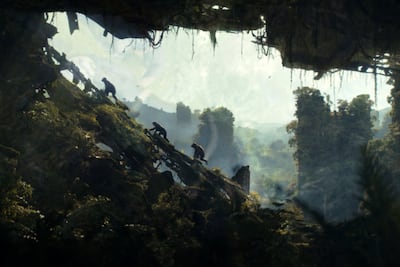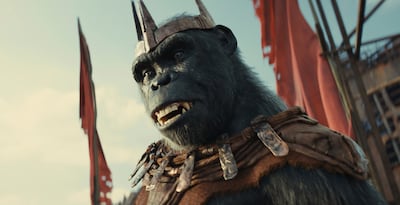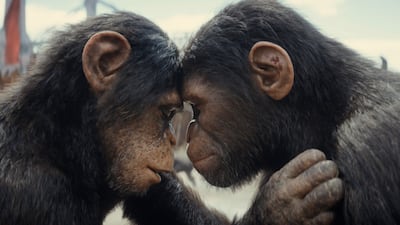There’s big ideas underlying the Planet of the Apes films. There always has been. From the first film in 1968 until the most recent in 2017, the series has remained thematically rich in its exploration of humanity's flaws, touching on nuclear proliferation, slavery and subjugation, religious extremism, and more, depending on the instalment.
The most recent trilogy took us back to the origins of humanity’s downfall from a man-made virus and the rise of intelligent apes in our stead. Those films never seemed to question whether we deserved our fate because of our hubris – of course we did – but rather were concerned with whether our sins could be forgiven, and whether we were worth saving.
The overall story followed Caesar, an ape raised by humans who is the only one alive who saw firsthand the good in our species, becoming our only champion. He believes in co-existence, forgiveness and compassion, and when his story ends, his legacy is a hopeful one for both their species and ours.
In Kingdom of the Planet of the Apes, which picks up centuries later, the memories of the great leader Caesar are all but forgotten. The earth has reverted to forest and jungle, and apes are primarily living in tribe-based societies, living in harmony with the land and each other.
The story begins with Noa (Owen Teague), a young member of the Eagle Clan. We’re following him through his tribe’s coming-of-age ritual: The retrieval of an eagle’s egg from the highest nest, to raise as your own, if you live to tell the tale.
The opening section feels downright utopian, reminiscent of the long stretches in James Cameron’s Avatar films in which we spend time with the Na’vi as they interact with the broader world of Pandora. There’s purity to their existence, a deep respect for the life around them. This makes it all the more agonising when it’s all ripped away, and the apes we’ve spent time learning to care for start being murdered indiscriminately.
Noa survives the initial onslaught, and as he flees, meets an orangutan named Raka (Peter Macon). Raka is the last surviving ape to have been taught their origins, who remembers the teachings of Caesar and wishes to keep his dream of peace and co-existence alive.

Noa’s clan was not killed by humans, in case you were wondering. Instead, there is an ape leader who is calling himself Proximus Caesar (Kevin Durand), who is inspired not by the ape of hundreds of years ago, but the man of thousands.
He sees the ruins of our world, and wishes that for his own. If he can bend the ape world to his will through whatever means necessary, he believes, that will once again be possible. If they can enslave the remaining humans, and harness their dormant weapons of mass destruction, perhaps they can use them to fuel his terrible rise.
This is when the big ideas of Kingdom begin to crystalise, the film becomes a worthy entry into one of the most consistent ongoing series in film history. The question is no longer whether humanity deserves to continue. The question is, are the apes doomed to repeat our mistakes? Will the same hubris plague them? Or can they maintain their veritable Garden of Eden?

If the film is successful, those are ideas that we’ll continue to ponder in future installments, as it becomes clear quite quickly this is laying the groundwork for another trilogy. And based on the quality of this film, it deserves one. The characters are well drawn and compelling, performed with the same committed physicality and wealth of feeling that made Andy Serkis’s motion caption performance as Caesar so unforgettable, with CGI so well deployed, you never question the film’s constructed reality.
But, funnily enough, as much as all of this remains a potent metaphor for humanity’s many issues today, including the climate crisis and ongoing conflicts, it’s the human characters here that are the least compelling. Their world feels clunky in comparison, and where the humans' story might lead is less intriguing as a result. Will humanity be able to rebuild the world it lost? Who cares? I'd rather give the apes a chance, at this point.
But this series has earned my trust, as has new-to-the-series director Wes Ball. I’m ready for whatever prefix the Planet of the Apes may add next.
Kingdom of the Planet of the Apes is out in cinemas on Thursday


